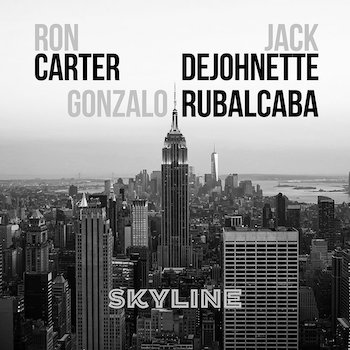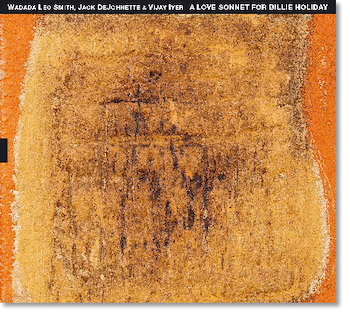Jazz Albums Review: “Skyline” and “A Love Sonnet for Billie Holiday” — Marching to the Beat of the Same Drummer
By Steve Feeney
The presence of veteran drummer Jack DeJohnette ties together two new releases.
Gonzalo Rubalcaba/Ron Carter/Jack DeJohnette – Skyline (5 Passion Records)
Wadada Leo Smith/ Vijay Iyer/ Jack DeJohnette – A Love Sonnet for Billie Holiday (TUM)
 Havana-born Gonzalo Rubalcaba, 58, has teamed up with esteemed jazz veterans Ron Carter, 84, and Jack DeJohnette, 79, for a release that exhibits a refined ease of expression. That said, Skyline doesn’t fully deliver on the high expectations promised by the personnel. But, leaving that consideration aside, the recording has more than its share of subtle pleasures.
Havana-born Gonzalo Rubalcaba, 58, has teamed up with esteemed jazz veterans Ron Carter, 84, and Jack DeJohnette, 79, for a release that exhibits a refined ease of expression. That said, Skyline doesn’t fully deliver on the high expectations promised by the personnel. But, leaving that consideration aside, the recording has more than its share of subtle pleasures.
The Afro-Cuban classic “Lagrimas negras” leads off the proceedings and it sets a high bar. This melancholy bolero gives Carter an early spot in the lead, and he puts the tune across with a nimble drama powered by his trademark suave assurance. When Rubalcaba comes back to the fore, his interpretation delivers a compelling intimacy. DeJohnette insinuates himself into the robust conversation with taps and cymbal whispers that gradually build as the pianist takes the piece through some fleet-footed runs. Try not to dance at least a little to this one.
The drummer offers a couple of welcome chestnuts from his songbook. “Silver Hollow” is a pensive piece that boasts an attractive melodic hook. The tune’s release sets up a round in which Rubalcaba picks apart the theme over Carter’s bent bottom notes. The composer’s subtle accompaniment makes this an exquisite “when-lights-are-low” journey.
DeJohnette’s “Ahmad the Terrible” powers up nicely after a soft, a-little-too-long intro. The jaunty theme is juiced up with playful variations. Carter’s walking bass pleasantly holds onto and then releases the tempo of this piece, which features some of Rubalcaba’s finest moments riffing above a shuffling drum current.
Carter’s “Gypsy” establishes the dapper bassist’s feel for something a bit more experimental. You can, in a sense, hear Rubalcaba thinking as he engages with this open-ended work. DeJohnette, here again, gives a lesson in jazz drumming, calling to mind the late Tony Williams, who backed an earlier recording of the piece.
The lesser tracks on this disc feel more like master-class exercises than full musical expressions. But they are still fun to hear — particularly because we know another gem is not far away.
 Approaching age 80, the venerable trumpeter/composer/bandleader Wadada Leo Smith continues to put out albums at a furious rate. His new A Love Sonnet For Billie Holiday attracted my attention because of the personnel on this trio disc.
Approaching age 80, the venerable trumpeter/composer/bandleader Wadada Leo Smith continues to put out albums at a furious rate. His new A Love Sonnet For Billie Holiday attracted my attention because of the personnel on this trio disc.
Keyboardist Vijay Iyer, 50, and drummer/percussionist DeJohnette have each played with Smith in the past. But the two have never played together with Smith — or in any other configuration. And this is surely a pairing that ought to be heard.
The title cut, a Smith composition, leads off the disc and gives DeJohnette an early chance to establish a sort of primal rhythmic context through splashing cymbals and message-sending taps on the drumheads. The others enter and they confirm the sense of elegy. Hints of a blues inflection suggest the subject matter. Iyer generates a pensive base under the leader’s long-held tones as DeJohnette begins to rumble a bit. The piece heads into the outer reaches of improvisation before gentler moments signify a return to its initial respectful/mournful ambiance.
“Deep Time No.1,” an Iyer contribution, begins with the players emerging under an excerpt from a speech by Malcolm X. Smith’s muted horn work creates a sense of otherworldly mystery, aided and abetted by the composer’s slow Fender Rhodes tinklings and electronic washes. DeJohnette edgily works the cymbals in a piece that self-consciously considers the broken promise of the past. A drum-led final passage recedes with Malcolm’s voice (gone too soon) in the background.
The drummer’s “Song of World Forgiveness” is an anthemic reminder of DeJohnette’s long commitment to the power of music for good. Iyer builds a lovely solo, full of a probing drama until Smith reenters with muted lyrical reflections implied by the subject matter. The players reach for and succeed in locating a hopeful close.
The lengthiest piece (with the lengthiest title) is Smith’s “The A.D. Opera: A Long Vision with Imagination, Creativity and Fire, a dance opera (For Anthony Davis).” This one goes out and stays there for long stretches (18:11 in total), its turbulence leavened at the arrival of a tranquil midpoint. Some of Miles Davis’s spacey interludes from the ’70s may come to mind. Iyer steps out intensely on piano with DeJohnette matching his twists and turns with hurry-up flair. Smith closes it all out with a regal high note, Iyer with a chord, and DeJohnette with a shimmering cymbal stroke.
The uptempo “Rocket,” a collectively composed short piece, closes out the disc. With Iyer on Hammond B-3 and DeJohnette doubling up the beat, Smith’s open horn ruminations suggest that further recordings from this threesome would be most welcome.
Steve Feeney is a Maine native and attended schools in Maine, New Hampshire, and Massachusetts. He has a Master of Arts Degree in American and New England Studies from the University of Southern Maine. He began reviewing music on a freelance basis for the Portland Press Herald/Maine Sunday Telegram in 1995. He was later asked to also review theater and dance. Recently, he has added BroadwayWorld.com as an outlet and is pleased to now contribute to Arts Fuse.
Tagged: 5 Passion Records, Gonzalo Rubalcaba, Jack DeJohnette, Ron Carter, TUM, Vijay Iyer
